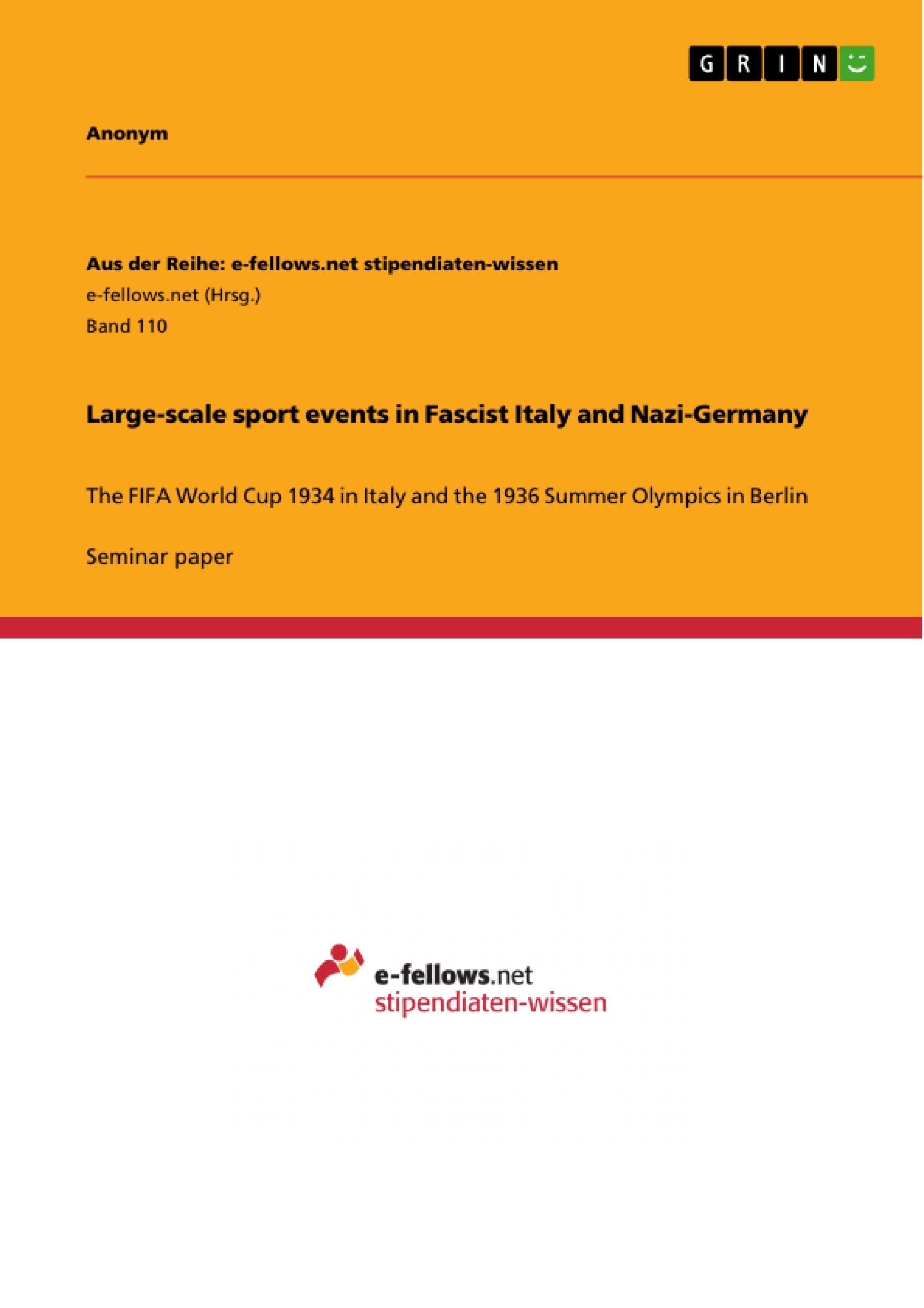Since the 1930s, international sport has become a form of cross-cultural activity which is able to attract and influence broad masses. It serves as a symbol of identification, be it either with a single athlete or the entire nation. It is, in contrast to economic or diplomatic relations, not object to direct governmental involvement; yet, exactly this uncommon opportunity of non-obvious political influence and interference has been appealing to regimes throughout the time. Big international sports events as a tool for political propaganda were discovered by Mussolini and Hitler, pertaining to 'their' respective event. The all forms of sport embracing Olympic Games, despite good-sounding mythological elements, turned out to mainly thrive on ties to global affairs, especially in non-democratic states. In this respect, Hitler’s Nazi-Germany took the vanguard role in 1936 by realizing how behind mere sports competition domestic and international goals could be pursued. Two years earlier, the fast-growing single sports competition, namely the Football World Cup, had already been captured by the Fascist regime in Italy which saw the chance for an intrusion of political content as well.
In the context of this History course which focuses on those two political movements, this paper tackles the question to which degree the named large-scale sports events were actually abused in the respective countries for propaganda purposes. Hereby, motives, goals, and strategies of the two regimes will be examined to obtain a comprehensive analysis. Finally, a concluding short comparison aims at clarifying which government accomplished its goals more 'successfully'.
Of course the realm and the content of the two events don’t allow an entirely congruent comparison. However, as Martin (2004) argues correctly, both Hitler and Mussolini believed that the road to power lay “through […] the manipulation of mass passions” (p. 102). Indeed, as we will see, the similarities are striking, and the World Cup in Mussolini’s Italy, for instance, is not for nothing referred to as “his Berlin Olympics” (ibid., p. 173). The first part of this paper will now elaborate more on this 'national game' of the Duce when it was hosted by the Fascist regime in 1934.
Inhaltsverzeichnis (Table of Contents)
- Introduction
- The fascinization of the Football World Cup 1934
- The 1936 Summer Olympics in Berlin
- Conclusion: World Cup vs. Olympics
Zielsetzung und Themenschwerpunkte (Objectives and Key Themes)
This paper investigates the extent to which the FIFA World Cup 1934 in Italy and the 1936 Summer Olympics in Berlin were utilized for propaganda purposes by the Fascist and Nazi regimes respectively. It examines the motives, goals, and strategies employed by both regimes, aiming to provide a comprehensive analysis and a brief comparison of their achievements.
- The use of large-scale sporting events as a tool for political propaganda
- The role of sport in promoting national identity and unity
- The manipulation of sporting events to achieve political goals
- The impact of these events on domestic and international perceptions of the regimes
- The similarities and differences in the approaches of Mussolini and Hitler
Zusammenfassung der Kapitel (Chapter Summaries)
- Introduction: This section introduces the topic of large-scale sporting events as a vehicle for political propaganda, highlighting the use of the FIFA World Cup 1934 and the 1936 Summer Olympics by the Fascist and Nazi regimes respectively. It outlines the paper's objectives, key themes, and methodological approach.
- The fascinization of the Football World Cup 1934: This chapter delves into the Fascist regime's utilization of the 1934 World Cup for propaganda purposes. It examines the regime's motives, goals, and strategies, including the promotion of physical strength, national unity, and international prestige. It discusses the impact of the World Cup on the Italian people and the international community.
- The 1936 Summer Olympics in Berlin: This chapter analyzes the Nazi regime's use of the 1936 Summer Olympics for propaganda purposes. It examines the regime's motives, goals, and strategies, including the promotion of Aryan supremacy, national unity, and international recognition. It explores the impact of the Olympics on the German people and the international community.
Schlüsselwörter (Keywords)
The primary focus of this paper is the political use of sports events in Fascist Italy and Nazi Germany, specifically the FIFA World Cup 1934 and the 1936 Summer Olympics. Key concepts include propaganda, national identity, political manipulation, international relations, and the impact of these events on domestic and international perceptions of the regimes.
Frequently Asked Questions
How did Mussolini and Hitler use sports events for propaganda?
Both regimes used large-scale sporting events to manipulate mass passions, promote national unity, and showcase their political ideologies to domestic and international audiences.
What was the significance of the 1934 Football World Cup in Italy?
The Fascist regime captured the World Cup to promote physical strength and national prestige, often referred to as Mussolini's equivalent to Hitler's Berlin Olympics.
What goals did the Nazi regime pursue with the 1936 Berlin Olympics?
Hitler used the Games to demonstrate "Aryan supremacy," gain international recognition, and present a peaceful image of Germany while pursuing domestic political goals.
Are there striking similarities between the 1934 and 1936 events?
Yes, the strategies of manipulating mass emotions and intrusive political content were central to both regimes' approaches to these competitions.
Why are sports events effective as tools for non-obvious political influence?
Unlike diplomacy or economics, sports attract broad masses and serve as powerful symbols of identification, allowing regimes to project influence indirectly.
Which regime was more "successful" in achieving its propaganda goals?
The paper concludes with a short comparison to clarify which government more effectively utilized their respective event to accomplish their specific political objectives.
- Quote paper
- Anonym (Author), 2008, Large-scale sport events in Fascist Italy and Nazi-Germany , Munich, GRIN Verlag, https://www.grin.com/document/175315



